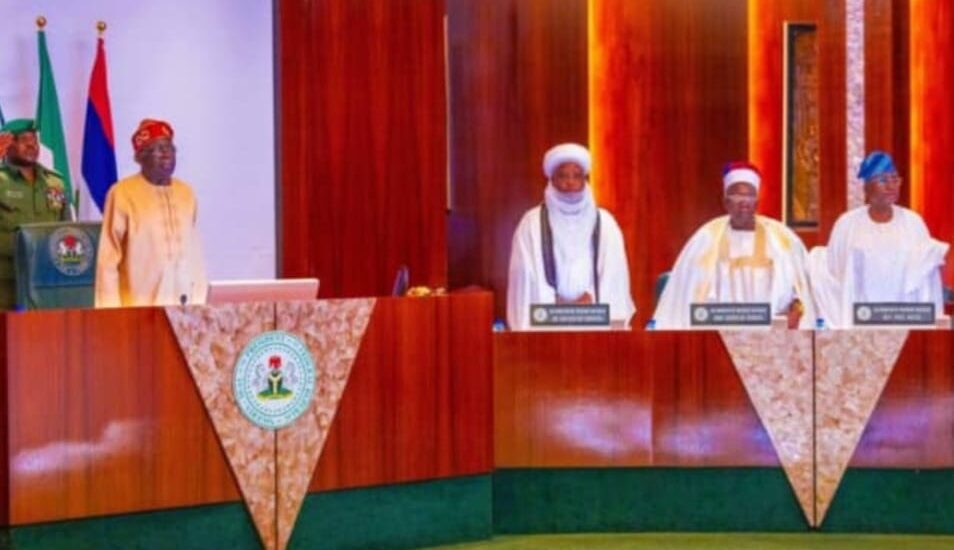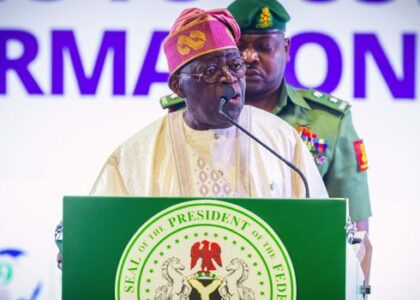By Paul Ejime
Nigeria’s President Ahmed Bola Tinubu, the ECOWAS current Chairman has urged the Islamic group involved in negotiations with the Niger junta to return to Niamey, stressing that diplomatic options would be exhausted before possible military intervention as a last resort.
“…General Abdulsalami Abubakar (a Nigerian former military Head of State) instituted a nine-month transition programme in 1998, and it proved very successful, leading the country into a new era of democratic governance,” a presidential spokesman said in a statement in Abuja on Thursday, 31st August.
Gen Abubakar is the ECOWAS Special envoy to Niger.
“The President sees no reason why such cannot be replicated in Niger, if Niger’s military authorities are sincere,” the statement added.
President Tinubu spoke during an audience with a delegation of the Nigerian Supreme Council of Islamic Affairs, led by the Sultan of Sokoto, Alhaji Muhammad Sa’ad Abubakar III.
“I must thank you for your several visits to Niger Republic, but you will still have to go back. My fear has been confirmed in Gabon that copycats will start doing the same thing until it is stopped.
“We are neighbours with Niger Republic, and what has joined Nigerians together with their great people cannot be broken,” said the ECOWAS chairman.
Nigeria has already condemned the coup in Gabon, which ousted President Ali Bongo Odimba on the 26th of July.
On Niger, President Tinubu reiterated that “Nobody is interested in a war. We have seen the devastation in Ukraine and Sudan. But, if we don’t wield the big stick, we will all suffer the consequences together.”
The Gen. Abdourahamane Tchiani-led Niger junta has proposed a 36-month transition period, which ECOWAS has rejected.
But ECOWAS has not suggested any transition timetable for Niger, as it did with three other member States – Mali, Guinea, and Burkina Faso – which are also under military rule.
Algeria, one of Niger’s neigbbours has suggested a six-month transition timetable, but neither the junta nor ECOWAS has responded to that proposal.
The series of sanctions, which ECOWAS imposed on Niger over the coup that toppled elected and detained President Mohamed Bazoum, included border closure, freeze of financial transactions by ECOWAS member State and Nigeria’s suspension of vital electricity supplies, are biting hard on the population.
President Tinubu described the soldiers’ action as “unacceptable,” warning that “the earlier they make positive adjustments, the quicker we will dial back the sanctions to alleviate the sufferings we are seeing in Niger.”
ECOWAS leaders had activated the regional Standby force for possible deployment in Niger, but military intervention is growing unpopular in the region because of Niger’s complex situation, compounded by its so-called strategic interest to foreign powers, particularly America and France.
Both countries have military bases in Niger and are working to protect their defence and financial interests, especially the mining of Niger’s priced uranium.
Washington also appears undecided whether to classify the Niger putsch as a coup or an attempted coup, because its constitution frowns against relations with a regime that assumed power through a coup.
Amid the growing tension and volatile situation, the U.S, dispatched its new Ambassador to Niger recently, while France insists that its ambassador expelled by the junta should stay put.
The junta now say the French envoy has been stropped of all diplomatic immunity, further jeopardising the Niger-France diplomatic relations.
There have been sporadic anti-French street demonstrations in Niamey and at the entrance to the French military base, with Niger armed forces restraining the crowd from forcing their way into the base.
Military intervention under such complicated situation could unleash unintended consequences and humanitarian disaster in the Sahel and ECOWAS region, already scarred by insecurity linked to insurrections by Islamic jihadists and other terrorist and separatist groups.
A transition timetable shorter than the 36 months announced by the Niger junta could be a compromise to break the stalemate in Niger and resolve the crisis diplomatically.







